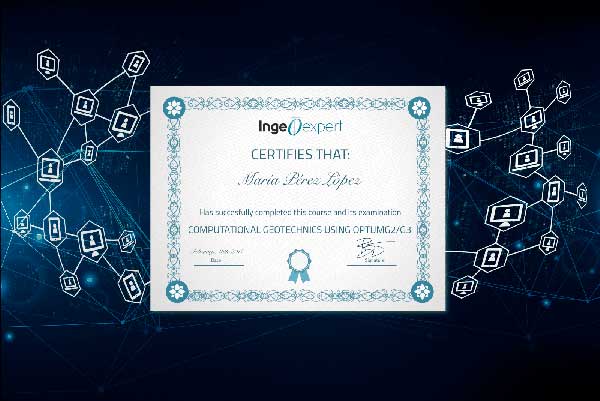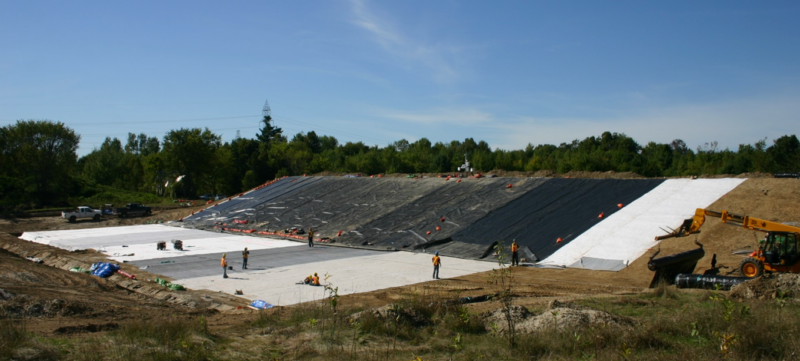Landfill Design for Municipal Solid Waste
Online course |
|
50 hours / 6 weeks |
|
To be determined |
Introduction
Landfills are engineered containment systems that are used for safe disposal of municipal solid waste in the ground. Although, we aim to decrease the volume of municipal waste by recycling and use incineration systems in modern era, there still left huge volume of waste that can only be managed by safe disposal through landfill systems. For example, more than 70% of municipal solid waste is disposed in landfills in North America.
The design and construction of these landfill facilities require a proper understanding of waste materials, geoenvironmental behavior of supporting ground materials, and hydrogeology of the landfill site to ensure long-term stability of the landfill and protection of the environment.
Objectives
This short course will focus on the analysis and design of municipal solid waste landfills to minimize contamination of surrounding environment. Most engineers with responsibility for design and construction of containment and barrier systems need a working understanding of basic concepts to gain confidence in dealing with a variety geoenvironment related problems that they encounter on engineering projects. This course is designed so that participants can better understand modern landfills and learn from experts in geoenvironmental engineering on how to design and operate a safe and sustainable landfill. All key concepts and guidelines will be explained and emphasis will be placed on the practical application of the information provided.
Limited places.
Week 1: Municipal solid waste composition and management, engineering properties of waste, landfill standards, Landfill site investigation, site selection, and subsurface investigation, principles of situating the landfill, blowout, and excavation
Week 2: Landfill leachate generation, volume and composition of leachate, HELP program, cover design, long-term performance of cover.
Week 3: Landfill barrier systems: compacted clay liners (CCL), geosynthetic clay liners (GCL), geomembranes, leachate compatibility.
Week 4: Contaminant transport modelling, POLLUTE program, integration of hydrogeology with design.
Week 5: Design of Leachate Collection Systems (LCS), clogging, Bioreactor landfills, Landfill gas, gas collection system.
Week 6: Landfill stability analysis, Landfill control and maintenance, operation development and environmental monitoring, contingency measures.
Dr. M.T. Rayhani
Dr. M.T. Rayhani, P.Eng., is a Professor of Geotechnical Engineering and the director of Geo-engineering Research Group at Carleton University. He has over a decade of experience in research, teaching and engineering consulting, and has collaborated extensively with industry leaders worldwide. He has received research grants from the Natural Science and Engineering Research Council of Canada, Canada Foundation for Innovation, Transport Canada, and other funding agencies. Dr. Rayhani has presented short courses, seminars, and guest lectures on various topics related to frontier research in geotechnical and geoenvironmental engineering in Canada, the USA, France, Germany, Italy, India, Iran, and other countries. He holds a Ph.D. degree in Geotechnical Engineering from the University of Western Ontario and he is the author of over 50 publications in different areas of geo-engineering. Dr. Rayhani is a Registered Professional Engineer in the Province of Ontario.
The course is delivered online through our easy-to-use Virtual Campus platform. For this course, a variety of content is provided including:
– eLearning materials
– Videos
– Interactive multimedia content
– Live webinar classes
– Texts and technical articles
– Case studies
– Assignments and evaluation exercises
Students can download the materials and work through the course at their own pace.
We regularly update this course to ensure the latest news and state-of-the-art developments are covered, and your knowledge of the subject is current.
Live webinars form part of our course delivery. These allow students and tutors to go through the course materials, exchange ideas and knowledge, and solve problems together in a virtual classroom setting. Students can also make use of the platform’s forum, a meeting point to interact with tutors and other students.
The tutoring system is managed by email. Students can email the tutor with any questions about the course and the tutor will be happy to help.
This course would be beneficial to all environmental and civil engineering practitioners and especially to those involved in the design, approval and maintenance of landfills and any other hydraulic barrier systems, such as: civil, municipal, environmental and construction engineers, consulting engineers, plans review personnel in municipalities, public works professionals, plant engineers, who are involved with containment systems, technicians and specialists, geologists and earth scientists, environmental engineers who want to understand landfills or any other hydraulic containments. The course will be of value both for those who are new to landfills as well as to those who have experience with landfills.
Once a student finishes the course and successfully completes the assignments and evaluation tests, they are sent an accreditation certificate. The certificate is issued by Ingeoexpert to verify that the student has passed the course. It is a digital certificate that is unique and tamper-proof – it is protected by Blockchain technology. This means it is possible for anyone to check that it is an authentic, original document.
You will be able to download the certificate in an electronic format from the Virtual Campus platform. The certificate can be forwarded by email, shared on social networks, and embedded on websites. To see an example, click here.
This course will train practitioners that can work in any environmental and geotechnical related projects including the design and construction of ponds, landfills, hydraulic dams, tailing dams, mining projects, oil sands, municipalities, earthworks projects, and any consulting or construction companies involved with waste management.
Introduction
Landfills are engineered containment systems that are used for safe disposal of municipal solid waste in the ground. Although, we aim to decrease the volume of municipal waste by recycling and use incineration systems in modern era, there still left huge volume of waste that can only be managed by safe disposal through landfill systems. For example, more than 70% of municipal solid waste is disposed in landfills in North America.
The design and construction of these landfill facilities require a proper understanding of waste materials, geoenvironmental behavior of supporting ground materials, and hydrogeology of the landfill site to ensure long-term stability of the landfill and protection of the environment.
Objectives
This short course will focus on the analysis and design of municipal solid waste landfills to minimize contamination of surrounding environment. Most engineers with responsibility for design and construction of containment and barrier systems need a working understanding of basic concepts to gain confidence in dealing with a variety geoenvironment related problems that they encounter on engineering projects. This course is designed so that participants can better understand modern landfills and learn from experts in geoenvironmental engineering on how to design and operate a safe and sustainable landfill. All key concepts and guidelines will be explained and emphasis will be placed on the practical application of the information provided.
Limited places.
Week 1: Municipal solid waste composition and management, engineering properties of waste, landfill standards, Landfill site investigation, site selection, and subsurface investigation, principles of situating the landfill, blowout, and excavation
Week 2: Landfill leachate generation, volume and composition of leachate, HELP program, cover design, long-term performance of cover.
Week 3: Landfill barrier systems: compacted clay liners (CCL), geosynthetic clay liners (GCL), geomembranes, leachate compatibility.
Week 4: Contaminant transport modelling, POLLUTE program, integration of hydrogeology with design.
Week 5: Design of Leachate Collection Systems (LCS), clogging, Bioreactor landfills, Landfill gas, gas collection system.
Week 6: Landfill stability analysis, Landfill control and maintenance, operation development and environmental monitoring, contingency measures.
Dr. M.T. Rayhani
Dr. M.T. Rayhani, P.Eng., is a Professor of Geotechnical Engineering and the director of Geo-engineering Research Group at Carleton University. He has over a decade of experience in research, teaching and engineering consulting, and has collaborated extensively with industry leaders worldwide. He has received research grants from the Natural Science and Engineering Research Council of Canada, Canada Foundation for Innovation, Transport Canada, and other funding agencies. Dr. Rayhani has presented short courses, seminars, and guest lectures on various topics related to frontier research in geotechnical and geoenvironmental engineering in Canada, the USA, France, Germany, Italy, India, Iran, and other countries. He holds a Ph.D. degree in Geotechnical Engineering from the University of Western Ontario and he is the author of over 50 publications in different areas of geo-engineering. Dr. Rayhani is a Registered Professional Engineer in the Province of Ontario.
The course is delivered online through our easy-to-use Virtual Campus platform. For this course, a variety of content is provided including:
– eLearning materials
– Videos
– Interactive multimedia content
– Live webinar classes
– Texts and technical articles
– Case studies
– Assignments and evaluation exercises
Students can download the materials and work through the course at their own pace.
We regularly update this course to ensure the latest news and state-of-the-art developments are covered, and your knowledge of the subject is current.
Live webinars form part of our course delivery. These allow students and tutors to go through the course materials, exchange ideas and knowledge, and solve problems together in a virtual classroom setting. Students can also make use of the platform’s forum, a meeting point to interact with tutors and other students.
The tutoring system is managed by email. Students can email the tutor with any questions about the course and the tutor will be happy to help.
This course would be beneficial to all environmental and civil engineering practitioners and especially to those involved in the design, approval and maintenance of landfills and any other hydraulic barrier systems, such as: civil, municipal, environmental and construction engineers, consulting engineers, plans review personnel in municipalities, public works professionals, plant engineers, who are involved with containment systems, technicians and specialists, geologists and earth scientists, environmental engineers who want to understand landfills or any other hydraulic containments. The course will be of value both for those who are new to landfills as well as to those who have experience with landfills.
Once a student finishes the course and successfully completes the assignments and evaluation tests, they are sent an accreditation certificate. The certificate is issued by Ingeoexpert to verify that the student has passed the course. It is a digital certificate that is unique and tamper-proof – it is protected by Blockchain technology. This means it is possible for anyone to check that it is an authentic, original document.
You will be able to download the certificate in an electronic format from the Virtual Campus platform. The certificate can be forwarded by email, shared on social networks, and embedded on websites. To see an example, click here.
This course will train practitioners that can work in any environmental and geotechnical related projects including the design and construction of ponds, landfills, hydraulic dams, tailing dams, mining projects, oil sands, municipalities, earthworks projects, and any consulting or construction companies involved with waste management.
1 review for Landfill Design for Municipal Solid Waste
More info
Finish this course and get a certificate based on Blockchain
Landfill Design for Municipal Solid Waste

Blockchain technology makes the certificate incorruptible, enabling companies to verifiy its autenticity.





Delford Dovorogwa –
The course addresses practical issues in the field. Also loved the practical demonstration of working out the problems by the Professor.